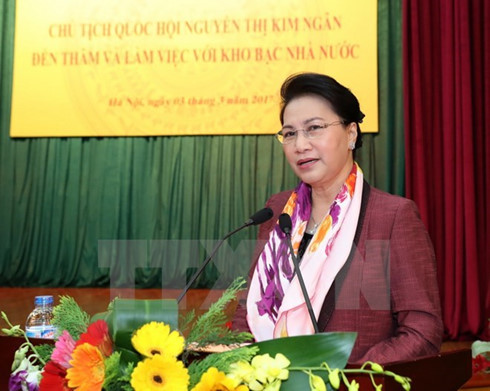State Treasury asked to continue following strategy till 2020
Thứ Bảy, 04/03/2017, 05:06
National Assembly Chairwoman Nguyen Thi Kim Ngan asked the Vietnam State Treasury (VST) to continue following orientations in its development strategy until 2020 with a vision to 2040 during a working session in Hanoi on March 3.
 |
| National Assembly Chairwoman Nguyen Thi Kim Ngan |
Addressing the session, Ngan hailed the VST for fulfilling its tasks of collecting State budget revenue each year, closely controlling budget expenses and revenues and raising capital for development by issuing treasury and government bonds.
She directed the financial sector and VST in particular to keep further tapping their role as advisors to the government and legislature in terms of financial-budget and fiscal policy management, pool all possible financial resources for national development, and propose measures to utilise such resources.She requested them to build on the past achievements to modernise their operations by adopting information technology and accelerating administrative reform.
Highlighting personnel work as crucial to every assigned task, the top legislator said the VST must always uphold the tradition of internal solidarity it has fostered over the past 27 years in the principle of democracy, openness and transparency, regular criticism and self-criticism.
The financial sector and VST need to further popularise the national patriotic emulation campaign, she said, adding that “Good People, Good Deeds” examples must be honoured and spread, thereby encouraging officials and cadres to overcome difficulties and fulfill assigned tasks.
About VST’s proposals, the leader said the legislature gave nod to the launch of e-treasury by 2020.
While functioning as the State budget manager and chief accountant, the VST was advised to propose amendments and supplements to relevant laws to the Finance Ministry, which will be submitted to the government and NA for consideration, thus creating a full and synchronous legal framework for VST to perform its function.
On amendments and supplements to laws and ordinances related to the opening of the VST’s bank account, the NA will mull over revisions to the Law on the State Bank of Vietnam and the Ordinance on Foreign Exchange Control in line with the Constitution 2013 and the Law on State Budget 2015.
The Finance Ministry and VST were required to work closely with the State Audit Office and the NA’s Finance-Budget Committee to devise the State budget balance sheet report to submit to the NA for approval.
They were also assigned to cooperate with concerned agencies to review the outcomes of realising development strategy until 2020, thereby laying a foundation to develop another strategy for the next period, which she said, should target refining regulations, promoting technological application, strengthening training of high-quality human resources to further improve the VST’s operations.
At the same time, she proposed them work with relevant agencies to build the Law on the VST or make changes to the laws on State budget, accounting and banking.
Reporting the outcomes of the VST’s development strategy in 2011-2016, VST Director General Nguyen Hong Ha said the budget revenue surged from 800 trillion VND (34.7 billion USD) in 2011 to 1,095 trillion VND (47.6 billion USD) in 2016 and spending stood at 5,500 trillion VND (239.1 billion USD) during the five-year period.
The issued government bonds are worth nearly 190 trillion VND (8.26 billion USD) per year.
VNA

